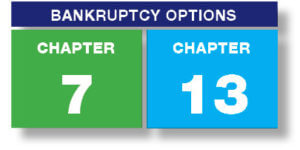
Bankruptcy Chapters and What Are The Differences?
There is much confusion over the various bankruptcy chapters. For the individual (including husband and wife) considering bankruptcy, Chapter 11 can be immediately ruled out. That’s because Chapter 11 is for a business, usually meaning a corporation or partnership. It is a reorganization of the business, with all significant decisions participated in (if not made) by a bankruptcy trustee, so as to keep the business functioning by managing debts that have become unsustainable. For the individual, though, this is not among the bankruptcy chapters that are relevant. What the individual (the term again meant to include husband and wife filers) must consider is the choice between the bankruptcy chapters 7 and 13. Let’s take them one at a time. Chapter 7, also known as ‘straight’, or ‘liquidation bankruptcy, is the most common, simplest, and most effective way to deal with debts that have become unmanageable. These typically include but are not limited to, credit card and medical bills. The entire Chapter 7 bankruptcy process typically only takes 3 to 4 months from filing to discharge which, if granted, eliminates all of the debtor’s unsecured obligations. Secured obligations, such as mortgage and car loans, are usually kept throughout and after the bankruptcy, assuming that the debtor desires to keep the underlying asset (house or vehicle).
The big advantage, among the various bankruptcy chapters, of Chapter 7 is that the debtor does not have to pay back any of his or her unsecured debts. Every penny, no matter the balance, get wiped out. That sounds like a pretty good deal – So why would a prospective bankruptcy filer choose any of the other bankruptcy chapters? That brings us to the last of the bankruptcy chapters under consideration: Chapter 13.
Chapter 13 can be thought of as a reorganization for individuals rather than businesses. Unlike in Chapter 7, the debtor in Chapter 13 does have to repay a portion of his unsecured debts, usually somewhere between 20 to 25 percent, over a (typically) 4 or 5-year repayment term. So why would anyone choose a Chapter 13 repayment plan, if under Chapter 7 no repayment at all would be necessary? Reason: Qualification for Chapter 7 involves limits on income and assets; that is, if you have too much income or too many assets, you might not qualify for a Chapter 7.
Your bankruptcy professional will know and understand all the applicable income and asset limits and advise you on the appropriate choice among the different bankruptcy chapters.
Chapter 7, also known as ‘straight’, or ‘liquidation bankruptcy, is the most common, simplest, and most effective way to deal with debts that have become unmanageable. These typically include but are not limited to, credit card and medical bills. The entire Chapter 7 bankruptcy process typically only takes 3 to 4 months from filing to discharge which, if granted, eliminates all of the debtor’s unsecured obligations. Secured obligations, such as mortgage and car loans, are usually kept throughout and after the bankruptcy, assuming that the debtor desires to keep the underlying asset (house or vehicle).
The big advantage, among the various bankruptcy chapters, of Chapter 7 is that the debtor does not have to pay back any of his or her unsecured debts. Every penny, no matter the balance, get wiped out. That sounds like a pretty good deal – So why would a prospective bankruptcy filer choose any of the other bankruptcy chapters? That brings us to the last of the bankruptcy chapters under consideration: Chapter 13.
Chapter 13 can be thought of as a reorganization for individuals rather than businesses. Unlike in Chapter 7, the debtor in Chapter 13 does have to repay a portion of his unsecured debts, usually somewhere between 20 to 25 percent, over a (typically) 4 or 5-year repayment term. So why would anyone choose a Chapter 13 repayment plan, if under Chapter 7 no repayment at all would be necessary? Reason: Qualification for Chapter 7 involves limits on income and assets; that is, if you have too much income or too many assets, you might not qualify for a Chapter 7.
Your bankruptcy professional will know and understand all the applicable income and asset limits and advise you on the appropriate choice among the different bankruptcy chapters.